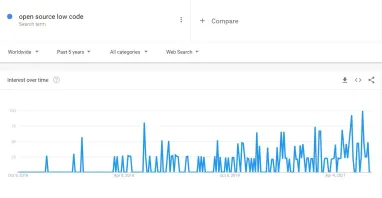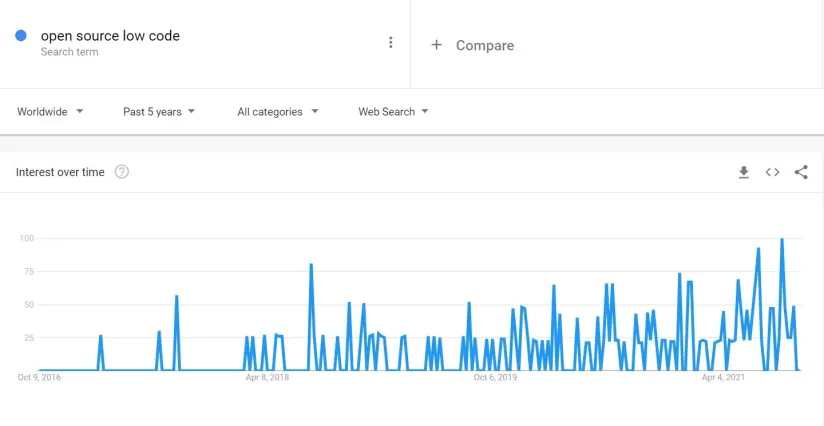Top 25 Open Source Low Code Development Platforms in 2024


The open source services market is expected to reach $50B by 2026. On the other hand, by 2024, 75% of large enterprises are expected to be using at least 4 low-code development tools for both IT application development and citizen development initiatives. These statistics indicate that an open source low code development platform may represent the best of both worlds for businesses.
What are open source low code platforms?
An open source low code development platform is an open source solution that allows the user to create applications via a drag-and-drop interface, minimizing the amount of code required to write and maintain. Open source low code platforms are usually free. However, some platforms provide enterprise-grade features for a reasonable fee.
To learn more about low code solutions, feel free to read our comprehensive article Low/ No code development: What it is, how it works, use cases.
Top 25 open source low code platforms
Here’s a list of the best open source low code platforms:
| Platform | Stars* | Source Code |
|---|---|---|
| Huginn | 36.5 | GitHub |
| WordPress | 16.7 | GitHub |
| Node-RED | 15.3 | GitHub |
| Budibase | 15 | GitHub |
| ToolJet | 13.3 | GitHub |
| Amplication | 8.6 | GitHub |
| PyCaret | 6.3 | GitHub |
| StackStorm | 5 | GitHub |
| Frappe Framework | 4.1 | GitHub |
| NocoBase | 3.2 | GitHub |
| Lowdefy | 1.9 | GitHub |
| Baserow | 1.3 | GitLab |
| SaltCorn | 0.9 | GitHub |
| Steedos | 0.85 | GitHub |
| Structr | 0.68 | GitHub |
| Corteza | 0.56 | GitHub |
| Joget | 0.37 | GitHub |
| Rintagi | 0.26 | GitHub |
| FormsFlow.ai | 0.18 | GitHub |
| Open Lowcode | 0.17 | GitHub |
| Convertigo | 0.16 | GitHub |
| Tymly | 0.1 | GitHub |
| nuBuilder | 0.06 | GitHub |
| OpenXava | 0.05 | GitHub |
| Appsemble | 0.02 | GitLab |
Pros and cons of open source low code platforms
Pros
Open source low code solutions combine the benefits of low code solutions such as reducing app development time and cost, and the advantages of an open source community with programmers and citizen coders constantly sharing new code and development ideas.
Cons
Open source low code solutions face some of the challenges in low code development such as limited customization and integrability. Additionally, they face some of the difficulties of open source software such as:
- Enterprise usage fees: Open source software is not entirely free, some services require additional costs such as maintenance, support, or training. This is not necessarily a disadvantage, most software used by enterprises come with fees.
- Support limitations: Although user communities are available for free, the process to get free support can be time consuming.
- Warranty limitations: Open source software licenses typically contain only limited warranty and no liability or infringement indemnity protection.
- Sustainability: Open source low code platforms are viable depending on the business needs and the skilled staff available. Therefore, projects may not be maintained if enough beneficiaries do not support the projects
- Changing licensing terms: Numerous successful open source software have been changing their licensing terms to protect their code. Such changes may affect enterprises using their software.
For more on low code/ no code development
If you want to read more about citizen developers, feel free to check out our article Citizen Developers: Who are they, Benefits & Frameworks
If you are interested in buying off-the-shelf low code products, check out our data-driven vendor lists sorted based on maturity, popularity, and satisfaction:
And if you still have questions on the topic, feel free to contact us:

Cem has been the principal analyst at AIMultiple since 2017. AIMultiple informs hundreds of thousands of businesses (as per similarWeb) including 60% of Fortune 500 every month.
Cem's work has been cited by leading global publications including Business Insider, Forbes, Washington Post, global firms like Deloitte, HPE, NGOs like World Economic Forum and supranational organizations like European Commission. You can see more reputable companies and media that referenced AIMultiple.
Throughout his career, Cem served as a tech consultant, tech buyer and tech entrepreneur. He advised businesses on their enterprise software, automation, cloud, AI / ML and other technology related decisions at McKinsey & Company and Altman Solon for more than a decade. He also published a McKinsey report on digitalization.
He led technology strategy and procurement of a telco while reporting to the CEO. He has also led commercial growth of deep tech company Hypatos that reached a 7 digit annual recurring revenue and a 9 digit valuation from 0 within 2 years. Cem's work in Hypatos was covered by leading technology publications like TechCrunch and Business Insider.
Cem regularly speaks at international technology conferences. He graduated from Bogazici University as a computer engineer and holds an MBA from Columbia Business School.
To stay up-to-date on B2B tech & accelerate your enterprise:
Follow onNext to Read
Codeless Automated Testing in 2024: Benefits & Challenges
Low/No Code Development in 2024: How It Works & Use Cases
N8N is not open source. Mendix is not open-source. Tools like Budibase and Huginn have thousands of Github stars and contributors. I feel they should be on this list.
Thank you for the feedback, we’ll look into it and update the article if necessary.
It’s been 3 months since the article was published, so maybe fix the errors.
Comments
Your email address will not be published. All fields are required.